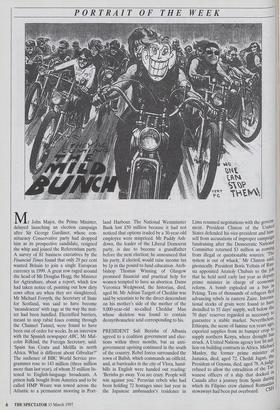PORTRAIT OF THE WEEK
Mr John Major, the Prime Minister, delayed launching an election campaign after Sir George Gardiner, whose con- stituency Conservative party had dropped him as its prospective candidate, resigned the whip and joined the Referendum party. A survey of 81 business executives by the Financial Times found that only 29 per cent wanted Britain to join a single European currency in 1999. A great row raged around the head of Mr Douglas Hogg, the Minister for Agriculture, about a report, which few had taken notice of, pointing out how dirty cows often are when they are slaughtered; Mr Michael Forsyth, the Secretary of State for Scotland, was said to have become `incandescent' with rage at the way the mat- ter had been handled. Electrified barriers, meant to stop rabid foxes coming through the Channel Tunnel, were found to have been out of order for weeks. In an interview with the Spanish newspaper ABC, Mr Mal- colm Rifkind, the Foreign Secretary, said: `Spain has Ceuta and Melilla in north Africa. What is different about Gibraltar?' The audience of BBC World Service pro- grammes rose to 143 million (three million more than last year), of whom 35 million lis- tened to English-language broadcasts. A prison hulk bought from America and to be called HMP Weare was towed across the Atlantic to a permanent mooring in Port- land Harbour. The National Westminster Bank lost £50 million because it had not noticed that options traded by a 30-year-old employee were mispriced. Mr Paddy Ash- down, the leader of the Liberal Democrat party, is due to become a grandfather before the next election; he announced that his party, if elected, would raise income tax by 1p in the pound to fund education. Arch- bishop Thomas Winning of Glasgow promised financial and practical help for women tempted to have an abortion. Dame Veronica Wedgwood, the historian, died, aged 86. Mr Adrian Targett of Cheddar was said by scientists to be the direct descendant on his mother's side of the mother of the 9,000-year-old so-called Cheddar Man whose skeleton was found to contain deoxyribonucleic acid corresponding to his.
PRESIDENT Sali Berisha of Albania agreed to a coalition government and elec- tions within three months, but an anti- government uprising continued in the south of the country. Rebel forces surrounded the town of Ballsh, which commands an oilfield, and, at barricades in the city of Vlora, hand- bills in English were handed out reading: `Berisha go away. You are crazy. People will win against you.' Peruvian rebels who had been holding 72 hostages since last year in the Japanese ambassador's residence in Lima resumed negotiations with the govern- ment. President Clinton of the United States defended his vice-president and him- self from accusations of improper campaign fundraising after the Democratic National Committee returned $3 million as coming from illegal or questionable sources; 'The system is out of whack,' Mr Clinton said, gnomically. President Boris Yeltsin of Rus- sia appointed Anatoly Chubais to the job that he held until early last year as deputy prime minister in charge of economic reform. A bomb exploded on a bus 10 Peking. Tens of thousands of refugees fled advancing rebels in eastern Zaire. Interim' tional stocks of grain were found to have dwindled to 55 days' supply, well below the 70 days' reserves regarded as necessary to guarantee a stable market. Nevertheless, Ethiopia, the scene of famine ten years ago, exported supplies from its bumper crop to supply northern Kenya, where drought has struck. A United Nations agency lost $6 nit lion on building contracts in Africa. Michael Manley, the former prime minister of Jamaica, died, aged 72. Cheddi Jagan, the President of Guyana, died, aged 78. A judge refused to allow the extradition of the Tat wanese officers of a ship that docked in Canada after a journey from Spain durin g which its Filipino crew claimed Romantail,l. stowaways had been put overboard. CS'


































































 Previous page
Previous page